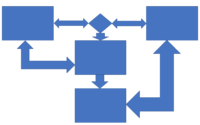Participation in Online Courses and Interaction With a Virtual Agent
Online learning environments could be well understood as a multifaceted phenomenon affected by different aspects of learner participation including synchronous/asynchronous interactions. The aim of this study was to investigate learners’ participation in online courses, synchronous interaction with a conversational virtual agent, their relationships with learner performance, and the participation/interaction factor identification. To examine learner participation, […]
















